Why is Suikoden such a big deal?
The series' spiritual successor Eiyuden Chronicle is a Kickstarter smash. Why are fans so passionate?
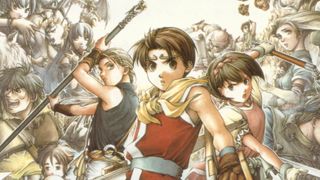
To say Eiyuden Chronicle’s Kickstarter campaign has been successful would be an understatement. Eiyuden presents itself as a spiritual successor to Konami’s acclaimed JRPG series Suikoden, reuniting original director Yoshitaka Murayama with several key developers. Launched with a funding goal of just over $500,000, it has now wrapped up with $4.57 million in funding, having hit every one of its stretch goals.
It’s been compared to Castlevania’s spiritual successor, Bloodstained: Ritual Of The Night, Kickstarted by ex-Konami producer Koji "IGA" Igarashi, who has lent support to Eiyuden. Suikoden was never as popular as Castlevania though, yet it has maintained a dedicated fanbase. What draws the passion of Suikoden fans even now? Quite simply, it’s one of a kind.
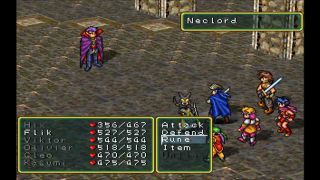
Suikoden took inspiration from 14th century Chinese novel Shui Hu Zhuan or Water Margin, a tale of governmental oppression, betrayal, and social unrest during the Song Dynasty in which a group of 108 outlaws successfully defeat Emperor Huizong’s army at Liangshan Marsh. Granted official amnesty by the Emperor, they end up becoming officially recognised. The Suikoden games borrow many of these concepts, each detailing a fight for liberty in an unjust world.
Many of Suikoden’s power struggles are motivated by The 27 True Runes, god-like artifacts that represent aspects of existence. From basic elements like wind and fire to the concept of punishment itself, True Runes grant their wielder immense power. Unsurprisingly, this power leads to wars for their control.
In the first Suikoden, you played a recruit to the Scarlet Moon Empire’s Imperial Army and the son of an esteemed general. After discovering the depths of the Scarlet Moon Empire's corruption and how they subjugate their citizens, you escape the Imperial capital with possession of a True Rune known as Soul Eater, joining the Toran Liberation Army and eventually recruiting the 108 Stars of Destiny to take down the Empire.
Suikoden 2 takes place several years later and follows a similar structure, focused on Riou and Jowy, two members of Highland Kingdom’s youth brigade. Finding their unit massacred by Highland’s own prince, Luca Blight, the two friends escape by jumping into a river. Later they learn Luca has blamed this attack on the city-state of Jowston, providing formal justification for a new war. Playing as Riou, you create a new 108 Stars of Destiny (though some characters return), and form an army to rebel against Highland.
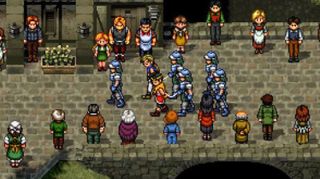
The Suikoden series delved into the ethical and moral complexities of wars, and the politics behind them, in a way that games rarely do—especially back in 1995. Even now, many developers skim over the grim realities of war, using it as a convenient excuse for battles and new shooters.
The biggest gaming news, reviews and hardware deals
Keep up to date with the most important stories and the best deals, as picked by the PC Gamer team.
By focusing on such a large group, Suikoden goes against the cliche of a small team saving the day against great odds. Not all of the Stars were playable, but every one was significant, and with each member gained your castle grew, adding an element of base building. Many writers would balk at such a huge roster, but Suikoden managed them with care and gave each character their own personality.
Better still, everyone’s stats were unique, with different weapons, abilities and combos. Battles came in three forms but primarily this was a turn-based affair in keeping with your standard JRPG, employing a six-character party to defeat enemies with attacks or rune-based magic. There were also solo duels, putting your protagonist into single combat with another character, taking a "Rock, Paper, Scissors" approach to battles.
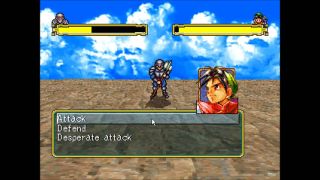
Army Battles were undoubtedly the highlight, an area Suikoden 2 expanded on significantly. Also using an RPS approach to combat in a similar manner to Fire Emblem, you moved across a grid and instead of just your vanguard, these battles relied on your army’s overall strength. Odds of success were affected by how many units you’d recruited, and choices held a lot of weight. Characters could permanently die if you were careless. It really made you feel like a leader, bringing a versatility unseen in mainstream JRPGs of that era.
The first game laid a great foundation, but in comparison to its sequel, it hasn’t aged as well. Suikoden 2 truly set the bar, retaining the core premise but expanding on its gameplay considerably. Reviews were not kind on release—Konami stuck to a pixel art approach when 3D graphics were the new thing—but those who played it found a masterpiece. It’s gained larger appreciation in recent years and Suikoden 2 is often considered one of the finest JRPGs ever.
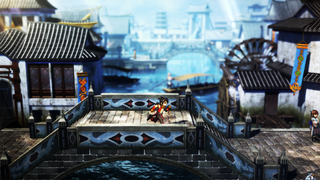
There’s a lot to say for later entries too (Suikoden 4 less so), but ultimately, Suikoden’s legacy was cemented by the original two. It remains a criminally neglected series and given Konami’s recent business decisions, fans have given up waiting for them to do something with it. But with the writer of the first two games at the helm, and drawing on key elements like the recruitable army, Eiyuden Chronicle looks set to tap into Suikoden's fine legacy. Personally, I can't wait to see the final result.
Most Popular

